~To Live and Die in Dixie~ *Doomsday* A History of the C.S.A.
- Thread starter unmerged(45168)
- Start date
-
We have updated our Community Code of Conduct. Please read through the new rules for the forum that are an integral part of Paradox Interactive’s User Agreement.
You are using an out of date browser. It may not display this or other websites correctly.
You should upgrade or use an alternative browser.
You should upgrade or use an alternative browser.
To everyone - Sorry about my absence, I've been pulling some major work at work trying to get enough money to buy a laptop and its drained most my time along with spending time with my gal, but I promise I have something big and juicy for you all when I finally get an update going.
To everyone - Sorry about my absence, I've been pulling some major work at work trying to get enough money to buy a laptop and its drained most my time along with spending time with my gal, but I promise I have something big and juicy for you all when I finally get an update going.
No worries! I wish I had any work at all right now to help pay my bills. Milk them, milk them for every cent you can!
The Fall
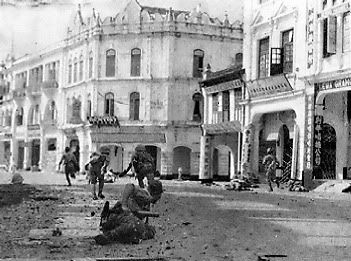
[Japanese Troops fight in an already battered Chinese City]

[Japanese Troops fight in an already battered Chinese City]
As the months drew on the situation for the Confederacy and the world grew more and more desperate. In Asia, the war between the Empire of Japan and the Soviet Union raged on with an unchecked brutality as the Mongols pushed a bloody and almost Pyrrhic swath towards the Chinese industrial heartland while the Red Army layed an equally costly siege on Manchuria and Sinking. The Imperial Japanese Army fought ferociously against the foreign incursion while pushing their own advance into eastern Mongolia and around the Soviet Lines on the Siberian East Coast in an attempt to encircle the attackers.
In the Confederacy, President Russel continued to struggle with the political blood bath that he was forced to wade through in an attempt to salvage the twisted state of his own struggling party. In early October, the President addressed the nation in a brash and surprising manner that shocked even members of the Whig Party.
– excerpt from President Richard Russel’s October radio address.“My fellow Americans, I come before you, humbled and ashamed, I sought to use my position as your President to bring back the glory days of the Whig Party, and have only succeeded in tearing our nation appart. For that, I am sorry.”
President Russel apologized to the nation and promised a new start, which he began by commissioning a new major public works policy that would build new roads, bridges, homes, railroads and public buildings in an attempt to save face with the public; and it worked.
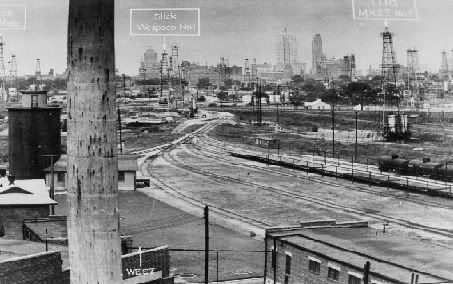
[Construction of the New Richmond-New Orleans Highway]
A series of new railroads and highways we’re quickly approved for commission, the most famous of which being the Richmond-New Orleans High way which connected the Gulf Coast with the East coast and linked many other cities with each other along the way. A new railroad would be built through Texas and up through the Stonewall Line, ending in Kansas City, while it was more military in nature, the new railroad was praised by many for connecting Texans and Missourians together, South with North, as it linked Houston and Kansas City together with a very important supply line. Along with the Richmond Super Highway, other highways and roads we’re also commissioned as well as public service lanes in the cities and country side, encompassing nearly every state, especially the more problem areas where the ‘socially and politically oppressed’ lived.
This undertaking would be praised by democrats and socialist alike as a step in the right direction, but under the praise worth exterior lay a more militaristic and strategic goal. The Cold War with the United State’s had all but drained the Confederacy of available fund’s without sinking itself into unrecoverable debt. President Russel, all but knew this too well, and took advantage of it. In a session with Parliament, the Russel was able to convince Parliament to pull funding from the C.A.T.E. plan (Confederate Aid to Europe) on the bases that the European nation’s we’re making little to no progress in rebuilding and based on France as an example, we’re falling into further decay.
Parliament voted in favor of pulling funding after a short deliverance and putting it into the hands of the President to rebuild and save the nations infrastructure and social stability. With billion’s of extra tax payers money, Russel was able to commission not only public works, but new roads and railroads for military use. Quickly, more money was funneled into the cyclone of military buildup as new warships and armored brigades we’re being developed to strengthen the Army in preparation for what Russel saw as an up and coming clash with the United State’s while Europe continued to fall into what could only be called a ‘Modern Dark Age’.
By early December of 1947, Russel had refortified his position as the head of state.
Nice update... but what does Russel think he is doing?
Is he actually pulling everything from Europe... troops, supplies, resources, money? If he is, I sense he is making a big mistake. There is no question that another world war is brewing, if it has not already begun. Letting the Soviet Union exhaust or worse, conquer the Japanese, will swing the balance power fatally to the United States with the former and to them in the later.
Come to think of it, is President Russel being a bit of a Neville Chamberlin here? He's basically appeasing the Soviet Union by doing nothing about it's aggression and I think it will cost him and the country dearly. My worst fear, is that West Germany, France or Britain will take matters into their own hands and try to take on the Soviet Union alone and they're not strong enough to do that.
Is he actually pulling everything from Europe... troops, supplies, resources, money? If he is, I sense he is making a big mistake. There is no question that another world war is brewing, if it has not already begun. Letting the Soviet Union exhaust or worse, conquer the Japanese, will swing the balance power fatally to the United States with the former and to them in the later.
Come to think of it, is President Russel being a bit of a Neville Chamberlin here? He's basically appeasing the Soviet Union by doing nothing about it's aggression and I think it will cost him and the country dearly. My worst fear, is that West Germany, France or Britain will take matters into their own hands and try to take on the Soviet Union alone and they're not strong enough to do that.
Nice update... but what does Russel think he is doing?
Is he actually pulling everything from Europe... troops, supplies, resources, money? If he is, I sense he is making a big mistake. There is no question that another world war is brewing, if it has not already begun. Letting the Soviet Union exhaust or worse, conquer the Japanese, will swing the balance power fatally to the United States with the former and to them in the later.
Come to think of it, is President Russel being a bit of a Neville Chamberlin here? He's basically appeasing the Soviet Union by doing nothing about it's aggression and I think it will cost him and the country dearly. My worst fear, is that West Germany, France or Britain will take matters into their own hands and try to take on the Soviet Union alone and they're not strong enough to do that.
There is actually only a small garrison of troops in the Federal Republic of Germany from the Confederacy and the Republic has quickly built up a sizable force to protect its sovereignty. The withdrawing of funds from C.A.T.E. will have an adverse affect though which will be made evident in the next update. The Western power's are weak, disorderly and the British and French Empires are on the verge of collapse.
With France losing all its middle eastern territory to independent nationalist movements and the British losing India and Pakistan, the Soviet Union and Empire Japan are the most stable nations coming out of the second great war.
Black Christmas
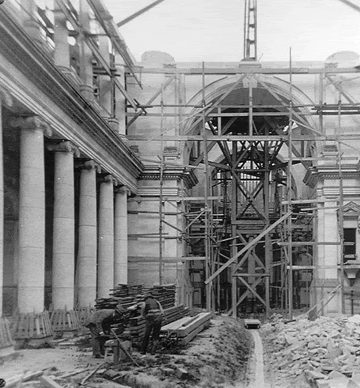
[The unfinished remains of the Democratic European Alliance headquarters would remain as a testimate to Europe’s ‘New Dark Age’.]

[The unfinished remains of the Democratic European Alliance headquarters would remain as a testimate to Europe’s ‘New Dark Age’.]
A great economist once theorized that the key to a successful Europe was a strong and stable Germany. This would become most evident when on December 24th, 1947 Europe experience a major economic and social disaster that could only be matched by the Dark Age’s of Medieval Europe. With increasing political tensions in British and French colonies as well as the lack of progress revitalizing the European economy Western Europe experienced a new social and economic collapse that negated all former progress made by Allied leaders. The Trans-Atlantic Alliance, headed by France, Britian and the Confederate State’s would become all but a hollow shell of what it was supposed to be with no real power to speak of.
Like wise, the Democratic European Alliance formed by the British and French Empire’s quickly fell apart when France was forced to pull out due to the loss of its Middle Eastern territories to nationalists and social decay resulting from the stress of the devastating aftermath of the past war to the nation. The Continent was rocked by growing recession and political upheaval. The war in Asia between Japan and the U.S.S.R. created a fear of renewed world war that would destroy the weak and fragile alliance of the west and bring about much doubt by the public in the national governments ability to protect the citzenery of the ‘Free World’.
The once united western Democracy's broke apart into economical alliances with France, Belgium, Luxembourg and the Netherlands creating the Economic Union of the Low Countries, the EULC, and Britain creating the Union of British Commonwealths, or the UBC.
The Federal Republic of Germany would find itself a ship afloat of political turmoil, economical disaster and social upheaval. While both Britain and France still held a military presence within the Republics borders and vowed to protect its independence, the nation was essentially on it’s own and the most important bastion standing against the fall of Democracy was alone against the Red tied.
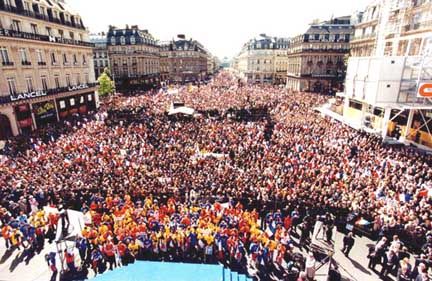
[Thousands in Paris rally for a change of Government during the December political protests.]
Throughout Europe in December, France in particular, thousands of people rallied for a change. In France, thousands flocked to the street’s echoing their desire for a new world, a safe world, free from the threat of Communism and foreign threats. What they demanded was a strong France. The recent loss of territory and weakening foundation on which France could stand on and call itself a world power was crumbling and the French government found itself faced with a growing nationalist movement that brought up old memories of Napoleon and an Imperial France that dominated the world. Many started believing the only way for a safe world would be through a strong national government that the weakening French Republic could not provide.
In Britain, tensions began rising between the Empire and its former colony of India when cut off all relations from the British government and made it clear they wanted nothing else to do with the empire.
Last edited:
http://www.youtube.com/watch?v=_mACNbbnYxQ (immediately thought of this  )
)
Will this dark age spread to the CSA as well?
Will this dark age spread to the CSA as well?
New Dawn
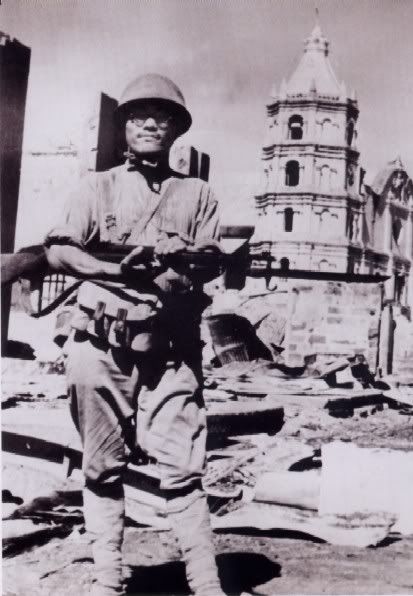
[Japanese soldier in Mongolia]
As the year 1948 dawned the world lay teetering on an increasingly uneven scale. War raged in the East while in the west the breakdown of the Allies left France once again tipping on the edge of revolution while the United Kingdom was faced with the threat of war against their former colony of India over valuable supply and raw material trade from Asia. The once mighty west had fallen into decay and strife while the communist block of Eastern Europe held firm under the iron grip of the possibly mad and strong willed Joseph Stalin. Despite the Communist block being a shining example of unity, however forced, it did nothing to better his chances in the increasingly costly and bloody war against the Empire of Japan.
Initial push’s into China and Manchuria we’re met with success, but following the first few months of success the Red Army and their Mongolian conscripts we’re halted in their tracks by the vallient Imperial Army. The dead mounted on the on icy steps of Mongolia and Siberia while General Tojo pushed the Soviet’s back on the Manchurian front and threatened to surround and cut off thousands of Soviet troops trapped in the bloody Manchurian stalemate. It would only be at the start of January that the Japanese Empire was hit with a supprise invasion by U.S. forces of the Japanese home island.
Imperial forces were struck by complete surprise as U.S. naval ships carrying several divisions and supply barges appeared off the shore of the Japanese home islands, successfully landings and driving back a shocked and horrified Japanese defense force. The shock of such a daring and unexpected move left the Imperial guard reeling, stopping the U.S. advance just miles away from Tokyo City where Emperor Hirohito was rushed out of the Imperial palace and away into a secret bunker beneath the city where they we’re planed to fight tooth and nail for the city.
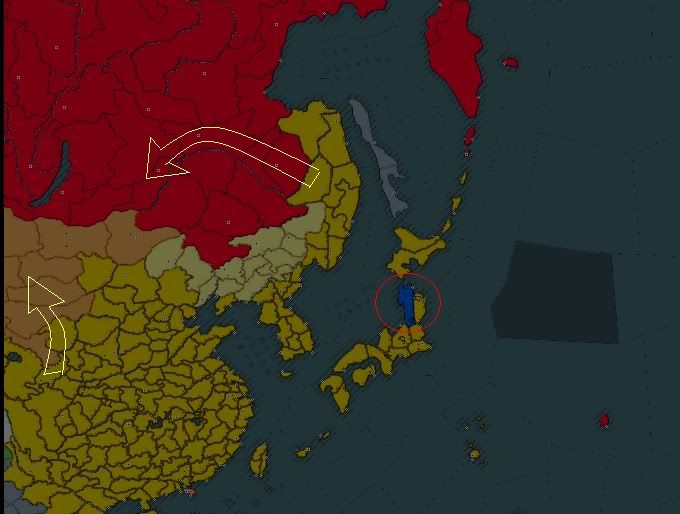
[The War in the East as of January 1st, 1948]
Such a daring move by the U.S. military forces shocked not only the Japanese, but nations around the world. However disastrous the move would become, with the Japanese Imperial guard forcing the U.S. army off the island, it earned the U.S. navy and army a reputation for being bold and vicious fighters with U.S. commanders calling it not a retreat, but simply an advance in a different direction. Alf Landon would later state that he meant serious buisness with Japanese and all enemies to the United States saying.
“No matter who you are or where your at, the United States of America will not stand for tyranny, weather it be across the border or across the sea, we are here to stomp it out”
President Russel would take that as President Landon taking a direct shot at the Confederate States, as Landon made it no secret his distaste for Russel’s administration or the Confederate States at all. Many saw war on the horizon, and it wasn’t one many in the Confederacy could easily say could be won. With the loss of support from France and Britain, the Confederacy and her dominions would have to stand on their own against the larger, more powerful United States. A frustrated Russel, facing wounded public image and lack of faith from his own party (despite his new works projects) would unofficialy back down from his position as President, and allow Vice President James Strom Thurmond to run the nation in his stead. Vice President Thurmond would be what saved the Whigs from another disastrous blemish on their already badly tarnished political record.
Tossing the political red tape aside, Strom mobilized military units into problem areas and had many rebel rouser leaders arrested and thrown in jail while Russel covered his actions by sweet talking Parliament and bribing those he could not convince the actions weren't in the best interest of the nation. Strom would quickly nationalize industrial elements owned by socialist leaders, more specifically those owned by members of the Southern Cougars, and place them under military surveillance and control.
Stroms actions we’re deemed by many to be unconstitutional and tyrannical, his main oposition coming from John Garner Jr. who saw the seizure of civilian industry and property to be no better than what Adolf Hitler did in Germany or what President Long did during his presidency. None the less, the majority of Parliament was behind Thurmond with what was left of the Democratic Party supporting his fast and decicive actions while the Whig’s believed he was strengthening their party authority.
Some pretty brave actions from the USA there! I'm not sure they'll be willing to risk a war with the Confederates while also fighting the Japanese however.
Damn, I've never seen a US that bold in any of my games. Usually, they take years island hopping before attempting a Japanese invasion.
The Breaking Point
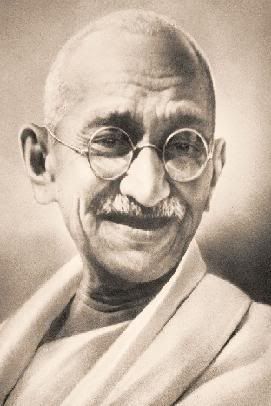
–Jawaharla Nehru“Friends and comrades, the light has gone out of our lives, and there is darkness everywhere, and I do not quite know what to tell you or how to say it. Our beloved leader, Bapu as we called him, the father of the nation, is no more. Perhaps I am wrong to say that; nevertheless, we will not see him again, as we have seen him for these many years, we will not run to him for advice or seek solace from him, and that is a terrible blow, not only for me, but for millions and millions in this country”
On January 30th, 1948 Mohandas Karamchand Gandhi was shot and killed while taking a nightly walk by an assassin’s bullet; The Great Gandhi, father of India, was dead within seconds. The unknown assailant alluded authorities, losing them in the night leaving only the bloody and broken body of the old and peaceful Indian nationalist behind. Millions mourned his death, not only in India, but across the world. That sadness would turn to anger as many believed the attacker to be a payed assassin of the British government, who’s relations with India had gone south over the past few months. The British government denied any involvement in the assassination, with Winston Churchill, the man who had long been seen as Gandhi’s rival and enemy to the freedom of India, mourned his death publicly in Britain along with other sympathizers. None the less, the Indian government saw it fit to punish the British, who and a majority of the public, were sure was behind their great father’s death. By the beginning of February, Indian military forces we’re poised to take what was left of British holdings in India while the fragile British Empire struggled to mobilize to defend their Asian possessions.
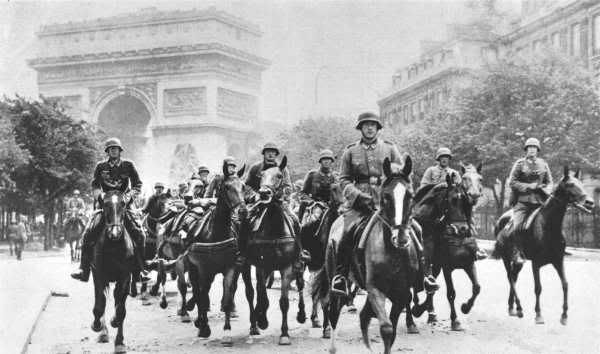
[French Nationalist Troops seize Paris]
As the world turned once again towards war, the Franco Nationalist Party finally sized control of the government with the support of the military, using examples such as the war in Asia and the new conflict between Britian and India to justify expelling the democratic government for a centralized, militarily led government that would be able to protect France and make her prosper. General Henri-Honore Giraud, a national hero for his valiant stand against Germany during the Great War and his continued fight in the French underground, led triumphant soldiers through the streets of Paris while his political counterpart, Jean de Bourbon, had political rivals arrested and their assets seized. To them and the public, a new French Empire had arrisin to take its rightful place as the supreme power of Europe.
In Asia, U.S. forces made a meracilious second landing in the northern part of Japan, with U.S. troops stabilizing a front just miles away from Tokyo City, capturing the regions of Akita, Sendai and Fukushima. While unable to dislodge the American forces completely, Japanese troops were able to quarantine and hold back further attacks while still fighting a bloody and massive front against the Communist incursion on mainland Asia. It wasn’t long before the Japanese Empire began petitioning the Confederacy for aid. A diplomat arrived in Richmond representing the Emperor and the Empire, meeting with both Thurmond and Russel, bringing forth a petition for military aid against the United States of America to allow the Japanese to concentrate on fighting the Soviets and Mongol threat.
This would be the opportunity Russel had been looking for; A way to unite the nation under one, firm, and unified banner. Relations with the United States had frozen over after several missed deals between President Al Smith and Russel, who had been lobbying for direct intervention since the proxy war in Venezuela. While President Russel was ready to jump into the fight, Vice President Thurmond warned Russel of the possible disaster that could come from it. While Russel sought to use war against a long time enemy to unify the nation, Thurmond saw through first hand in Venezuela and in Europe how war could have the opposite effect and spur revolution where he could only suppress it for now. Thurmond also knew that unless the Confederate armed forces could strike a quick and decisive blow to the U.S. at the start of the war, the U.S. industry and larger numbers would eventually overwhelm the Confederacy.
The United States Industrial might allowed them to build a larger army, navy and air force than the Confederacy could hope to match, but if able to overwhelm the initial defenses paralleling the Jackson Line and throw back the U.S. military and land a decisive victory, a successful war could be possible.
Russel, either through brass or foolish ambition, gave the order for Thurmond to prepare the military for a war with the United States and gave the Japanese diplomat, Chiune Sugihara, his unofficial word the within the following months that the Confederate States of America would join the Japanese Empire in battle against their common enemies.
well, the time has come to get serious heh, war is on the horrizon and I'm always open to new ideas for beating the big blue beast up north. Any advice or suggestions are much welcomed! heh
Edit: nvm, but I do have an interesting idea for a victoria/hoi entry now after this aar heh./FONT]
Edit: nvm, but I do have an interesting idea for a victoria/hoi entry now after this aar heh./FONT]
Last edited:
You want help beating the f**king USA in HoI2!!!!
Sorry, dude, I don't wanna get involved in this one, you're on your own!
..............................
.....................................
...good luck
Sorry, dude, I don't wanna get involved in this one, you're on your own!
..............................
.....................................
...good luck
You want help beating the f**king USA in HoI2!!!!
Sorry, dude, I don't wanna get involved in this one, you're on your own!
..............................
.....................................
...good luck
Traitor! lol Oh well, perhapse with the series of fortifications I have the U.S. will find it too costly to try and over run the CSA. Update coming detailing my plans to humble the USA!
Hit hard and fast, break their industrial back before they can put it to full force. If you're lucky, they will have plenty of forces tied down in the Pacific, while you are burning the White House to ground. How big is the US army, do have reliable intelligence?
BTW, what happened to your old avatar, is was great...
BTW, what happened to your old avatar, is was great...
Kickass! I'm away from the board for a few weeks and I come back to find this has returned. Some really interesting updates in there, Volga. Unsurprisingly postwar recession, instability in the east, and the tide of decolonialism has hit Europe hard. Historically the United States, through financial support, became the stabilizing force that kept Europe strong and free.
Here, though, well it looks as if the USA intends to provide itself as a stabilizing force in the world - under the dominance of the blue that is. That's a tough enemy you have to your north. If they attack sooner, it may be a bit easier, as a continuing struggle in Asia could divide their attention. Russel may have a smart thought by returning troops to the CSA. Free Europe is going to be unstable for some years yet, their only hope is that their greatest support across the Atlantic manages to keep itself independent. Only after the CSA can successfully defend against US aggression can the troubles of Europe be sorted. It may be a cold truth, but its the truth nonetheless...
Here, though, well it looks as if the USA intends to provide itself as a stabilizing force in the world - under the dominance of the blue that is. That's a tough enemy you have to your north. If they attack sooner, it may be a bit easier, as a continuing struggle in Asia could divide their attention. Russel may have a smart thought by returning troops to the CSA. Free Europe is going to be unstable for some years yet, their only hope is that their greatest support across the Atlantic manages to keep itself independent. Only after the CSA can successfully defend against US aggression can the troubles of Europe be sorted. It may be a cold truth, but its the truth nonetheless...
Operation: Bulldog
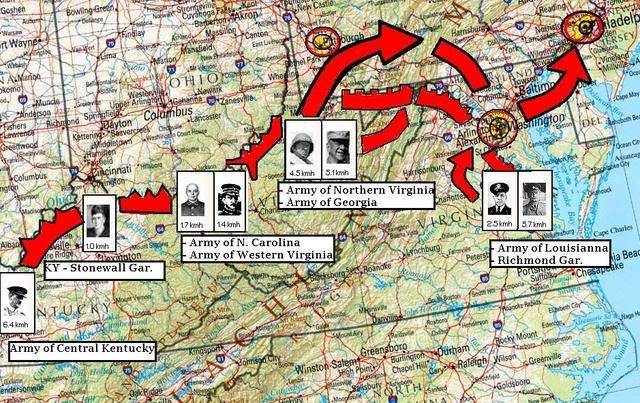
[Operation: Bulldog, courtesy of the Virginia Military Institute]

[Operation: Bulldog, courtesy of the Virginia Military Institute]
President Russel would ask of Vice President Thurmond and the military experts of the nation to do something that seemed almost an impossibility. President Russel wanted a viable plan to defeat the United States drafted and prepared by the end of February, 1948, giving Thurmond and his chosen staff of General’s only a little over a month to appease the President before the war would be scheduled. While Russel was lobbying for intervention against the Untied States,VP Thurmond, General George S. Patton of the Army of Virginia, General Knox of the Army of Central Kentucky, Nash Van Holt of the Army of Georgia and Watt-Page of the Army of Louisiana made the Virginia Military Institute their base of operations of planning for the coming war.
It would come as no surprise when General Patton would take the military conference by storm by laying out a plan that would eventually become known as Operation: Bulldog, the Confederate Offensive movement on the Eastern Front. Patton’s plan would involve a massive, co-ordinate move by all generals along the Stonewall Line, offering each other military support and aid whenever possible but with no major offensives being made on their own for fear of that the enemy fortifications would prove to strong to take along and an all out offensive would break the Confederate military effort. Patton’s vision would be painted in blood and steel along the nations borders with him holding the sword of destruction.
Patton knew that the war would not be won in the west, or the Midwest, but in the east. Operation: Bulldog would involve General Watt-Page making a faint attack towards Washington DC, supported by the Richmond Garrison while the other generals along the Stonewall Line would play the defensive, as he predicted that on the outbreak of war the United States would be quick to try and over run the Confederate fortifications along the bunker. While the U.S. would be busy attacking the Stonewall Line, in which the majority of the nations fighting men we’re taking up as they spoke, the faint against Washington would bring military forces in the East towards Washington to protect the nations Capital. Patton would then lead the Army of Northern Virginia, supported by the Army of Georgia and the Army of North Carolina in a breakthrough assault against US fortifications, drive towards Pittsburgh before swinging around to attack Washington from behind, and with the help of Watt’s men, capture the US capital before driving towards Philadelphia and the United States industrial heartland.
Patton dreamed of a great victory, the attack would be quick and fierce, and if things went as well as he hoped, he could not only deliver a devastating blow to the nations defenses, but capture the American government before they make their escape to Philadelphia, where the national government had fled to in wars past. From there on Patton would follow in Robert E. Lee’s footsteps, leading the Army of Northern Virginia on a glorious conquest of the U.S. industrial heartland.

[Patton’s pet Bulldog Terrier Willie at VMI, for which Patton would name his famous invasion after]
While well received by Vice President Thurmond and the other military advisers, General Knox, who led the equally famous Army of Central Kentucky(the Army of which General Jackson led during the War of Succession), believed that a drive in the east wouldn’t win the war alone. Like during the War of Succession, Lee’s drive in the east and capture of Washington brought down to bear the largest part of the U.S. military strength on the east. While Abraham Lincoln had escaped the siege of Washington, only to be forced to sue for peace as the American people began to lose hope, it wouldn’t be the case in this day and age. After two defeats at the hands of the Confederacy and President Al Smiths binding grip and love on the American people, this war wouldn’t be over so quick.
Knox offered another plan, that is, if Pattons plan succeded. Another offence in the west, perhapse into California, would serve the nation well to split American forces to protect their most populated and industrial areas. At the time of these attacks, Knox would lead another attack into Ohio, pushing towards the Great Lakes.
The attack would serve to cut off the Western and Eastern halfs of the United States, allowing Patton to fight in New England without worry of reinforcements arriving from the east. Both Knox and Patton would quickly become rivals, as each wanted victory for the nation, but personal glory as well. While Patton had led the Confederate Armored Corps into battle during the Second Great War, Knox would be the first to lead Confederate men in a major air drop into Ireland, and later lead the Confederate forces along with Patton to victory in Europe. The two’s we’re very well decorated war hero's and general, and there growing rivalry could help the nation, or tare it apart.
Good luck.
You're gonna need it.
Any intelligence reports about the power of the United States military?
You're gonna need it.
Any intelligence reports about the power of the United States military?

